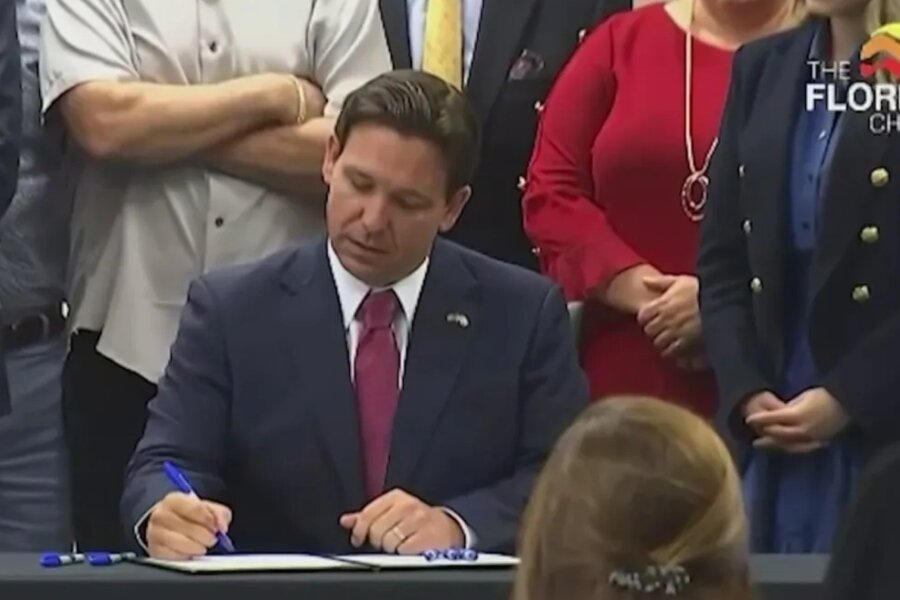A new law took effect on Monday in Florida, giving state law enforcement more authority to remove squatters and increasing criminal penalties for offenders. This change aims to empower homeowners to safeguard their property more efficiently, bypassing lengthy court procedures.
Gov. Ron DeSantis announced in a video on X that his state is putting an end to the “squatter scam once and for all” with HB 621.
“While other states are siding with the squatters, we are protecting property owners and punishing criminals looking to game the system,” DeSantis said at a press conference at the Orange County State Attorney’s Office after signing the bill in March.
“We’ve got people that will be here for seven months of the year, and then they’ll go to Michigan or New York or even Canada. You come back after the summer and someone’s in your house, and then they just get to stay there for six months. Now in Florida, you call up, you fill out a form, the sheriff comes, and the sheriff kicks him out of your property,” DeSantis previously told Sean Hannity of the law.
“If we don’t have private property rights, we will not have a free society, so it is the bedrock Florida stands by, and we’re proud to do it,” he added.
Attorney Kevin Fabrikant, who supervises Florida’s Eviction Law Firm, informed Fox News Digital that even before the bill’s passage, Florida’s legal process for removing squatters from properties was one of the quickest in the country, usually averaging about a month.
In contrast, squatters in states such as New York and California have become a persistent headache lasting months for some homeowners.
According to Fabrikant, it can be expensive for homeowners, beginning with a $300 filing fee and typically requiring costly legal representation.
Under the new law, law enforcement officers, who previously had limited options, can now bypass the court process and proceed with evictions. This can happen as long as the homeowner files an affidavit and the intruder meets specific criteria:
The squatter must have illegally entered the property, must have already been instructed to leave by the homeowner, cannot be a current or former tenant of the home, and cannot be an immediate relative of the homeowner seeking to remove them from the property.
“If you’re a squatter, I wouldn’t come to Florida to live,” Attorney Kevin Fabrikant said.
“It’s designed for a very narrow situation – if you let somebody into your property and you want them out, it likely may not apply,” Fabrikant added.
According to Fabrikant, the typical removal fee with a local sheriff’s department would be $90 in most Florida counties and $115 in Miami.
Under the new legislation, once officials confirm ownership and determine the complainant’s eligibility, the sheriff is required to remove the squatter.
Those who “encourage or engage in squatting” will face increased penalties under the law, the bill reads.
Squatters who forge leases or other proof of residence will be charged with a first-degree misdemeanor for making false written statements or falsifying documents.
Anyone who causes $1,000 or more in damages while occupying a property can now be charged with a second-degree misdemeanor.
“Somebody breaks into the house, destroys the house, that’s [the type of person] the governor intended [to police with this law],” Fabrikant said. “Those people cause immeasurable damages to have handymen or contractors fix what these squatters are doing to a property.”
Anyone who knowingly advertises the sale or rent of residential property without permission from the owner will now face a first-degree felony.
“Sometimes, Bob Squatter turns around and finds some people,” Fabrikant said. “Now you have to remove Bob Squatter and all these random people who [may not be aware that they’re illegally living on the property].”
There is uncertainty regarding how law enforcement in Florida will enforce the new law.
“They’re on the spot having to make a decision about whether a person qualifies under these scenarios,” Fabrikant said.
“There are times when the sheriffs are put in a tough spot because of the language and the claims that the occupant might make,” Fabrikant said. “In all likelihood, the sheriff’s office will be liable to a civil suit… if they remove someone wrongfully they would tend to get sued.”
Martin County Sheriff William Snyder has expressed to “Fox & Friends First” that he firmly believes the law will “absolutely” improve the situation.
“There’s a real technicality when you go out to a home and somebody proffers that they live there, then the legitimate owner has proved that it’s their house,” he said back in March.
“It gives us teeth to enforce the law and to return the home to the rightful owner,” he continued. “We’ll go right out there, and it’s our intention here in Martin County to get that home back into the hands of the rightful owner and get the trespasser out… and then I will provide them [the squatter] housing. They will not be unhoused. I’m putting them straight into my jail.”
Share your thoughts by scrolling down to leave a comment.













